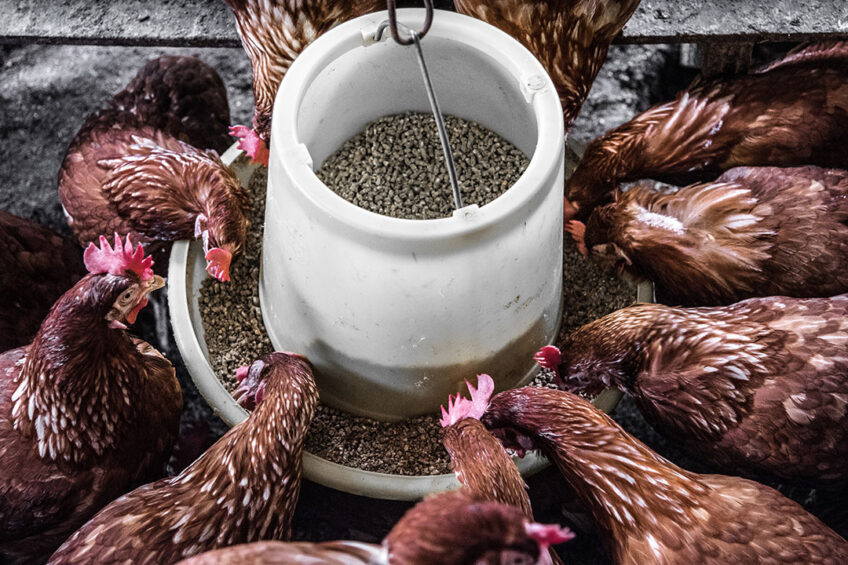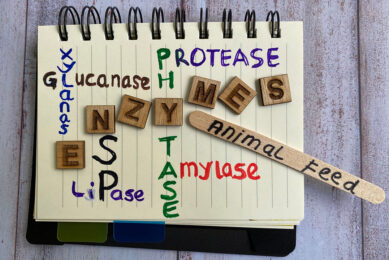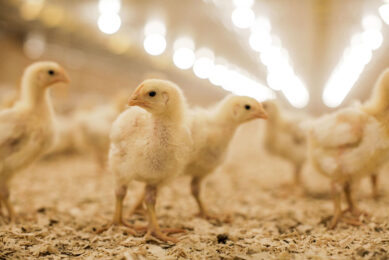Enzyme supplementation in poultry nutrition

Enzymes are biological catalyst composed of proteins which play an essential role in poultry nutrition. Recently, supplementation of feed enzymes in poultry diets is increasing to prevent the negative effects of anti-nutritional factors and to improve digestion of dietary components. This article will discuss the most common enzymes used in poultry feed and their impacts on poultry.
Enzyme supplementation decreases nutrient loss through excreta, reduces diets nutritional levels, improves nutrient availability; thus, enhances production efficiency and profitability. In addition, exogenous enzymes hydrolyse non-starch polysaccharides, increase the usage of feed energy, reduce negative impacts of non-digestive residues on digesta viscosity, and improve gut microbial ecosystem.
What are the enzymes?
Enzymes are proteins that are involved in all anabolic and catabolic pathways of digestion and metabolism. Enzymes are specific catalysts that act on substrates, and they are stable at 80-85°C for a short time. Increasing substrate concentration would enhance the rate of an enzyme catalysed reaction. Digestive enzymes are categorised as endogenous or exogenous.
Endogenous enzymes are produced by the animal and exogenous enzymes are administered from outside. To apply an enzyme in animal feed, adequate substrate needs to be available in the feed, the animal should be able to utilise the product of enzyme action, the enzyme must be stable during and after feed processing and in the feed until it is consumed, the enzyme needs to be stable in the animal’s gut, and the enzyme should interact efficiently with its target substrate.
What enzymes are generally used in poultry feed?
Cellulase, glucanase, pectinase, xylanase, galactisidases, phytase, non-starch polysaccharides degrading enzymes, amylase, lipase, cellulase, and protease are the most common enzymes used in poultry feed. These feed enzymes are commercially available as a single enzyme or as mixtures or cocktails of carbohydrate-degrading enzymes which can be combined with proteins and phytate degrading enzymes, as well.
Impacts of enzyme supplementation
Enzyme supplementation in poultry nutrition reduces feeding costs, allows flexibility on diets formulation, enhances performance and litter quality, improves poultry health, and reduces total production costs.
Phytase: hydrolyses phytate that is found in every ingredient from vegetal source, improves digestibility of phosphorus, amino acids, fat, carbohydrate, and minerals, and decreases mineral emissions. Supplementing phytase makes phytic phosphorus available resulting in reduced diet formulation cost without negative impacts on poultry performance. Furthermore, phytase reduces the pollutant potential of excreta, making poultry husbandry a more ecological activity.
Xylanases: provides higher values of metabolizable energy, increases weight gain, and improves Feed:Gain ratio. In addition, xylanase inhibits fermentation at the ileum and stimulates fermentation at cecum. Xylanase supplementation in wheat-based diets causes greater production of lactic acid at the ileum and propionate at the cecum which in turn improves broiler gut health.
Amylase and lipase: are generally used in corn/soybean meal-based diets to improve nutrient digestibility and growth performance.
Supplementation of xylanase, protease, and amylase increase weight gain and improves growth performance. Xylanases and proteases augment the efficiency of wheat-based diet utilisation. Protease, cellulase and amylase addition to soybean diet improves weight gain and Feed:Gain ratio in broilers. Non-starch polysaccharides increase the viscosity of diets due to its capacity of bonding to great amounts of water and forming a viscous gel and reduce the rate of substrate and digestive enzyme diffusion. Non-starch polysaccharides degrading enzymes reduce viscosity, increase enzymatic action on gut content, improve nutrient digestion capacity, enhance gut transit rate, decrease water amount in faeces, and provide a better litter quality.
Concluding remarks
Enzymes are proteins that are involved in all anabolic and catabolic pathways of digestion and metabolism. Exogenous enzymes are administered in poultry diets to make diet formulation more flexible, to reduce production cost, to decrease digesta viscosity, to enhance nutrients digestion, to improve Apparent Metabolizable Energy value of the diet, to increase feed intake, weight gain, and Feed:Gain ratio, to reduce beak impaction and vent plugging, to alter population of gut microorganisms, to lower water intake, water content of excreta, and production of ammonia from excreta, to improve the nutritional value of poultry diets and the subsequent performance. Further research is required to develop the enzymes that already exist in the nature with significant potential value to poultry into commercially available enzymes at affordable prices.
The All About Feed Newsletter
Sign up for our newsletter and receive all our need-to-know content three times a week.











